
Example Of Past Form Of Irregular Verbs BEST GAMES WALKTHROUGH
There are two tenses in English - past and present. The past tense in English is used: to talk about the past. to talk about hypotheses (when we imagine something) for politeness. There are four past tense forms in English: Past simple: I worked. Past continuous:
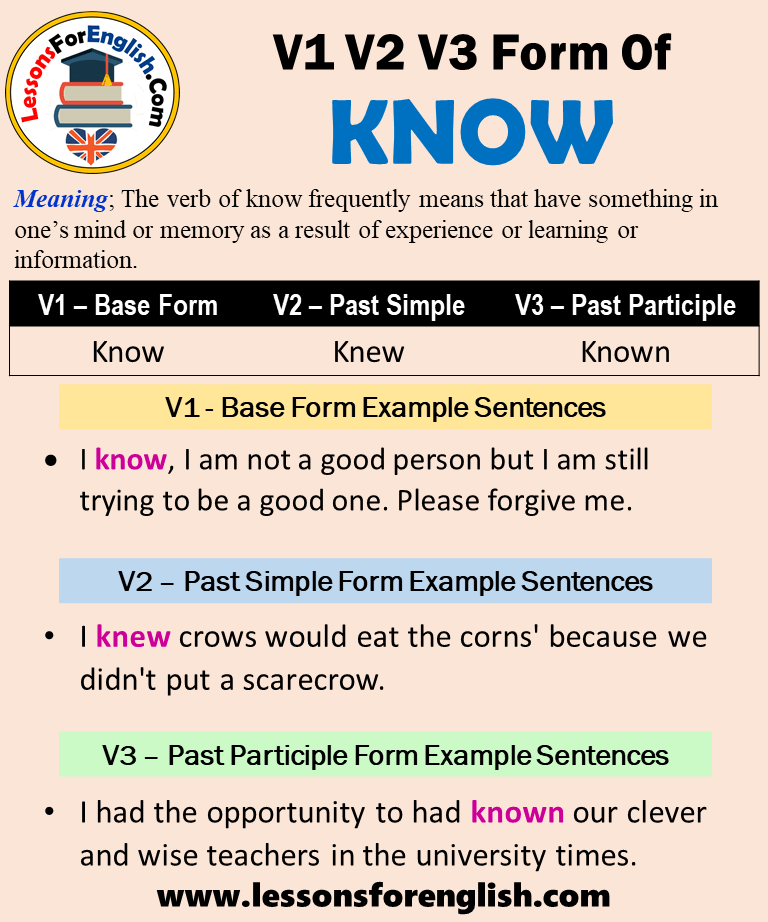
Past Tense Of Know, Past Participle Form of Know, Know Knew Known V1 V2
March 29, 2021 PDF Version knew or knowed (dialect), The past tense of know is knew or knowed (dialect), Table Of Contents: knew or knowed (dialect), The Forms of Know Conjugate Know Know in Present Simple (Indefinite) Tense Know in Present Continuous (Progressive) Tense Know in Present Perfect Tense Know in Present Perfect Continuous Tense
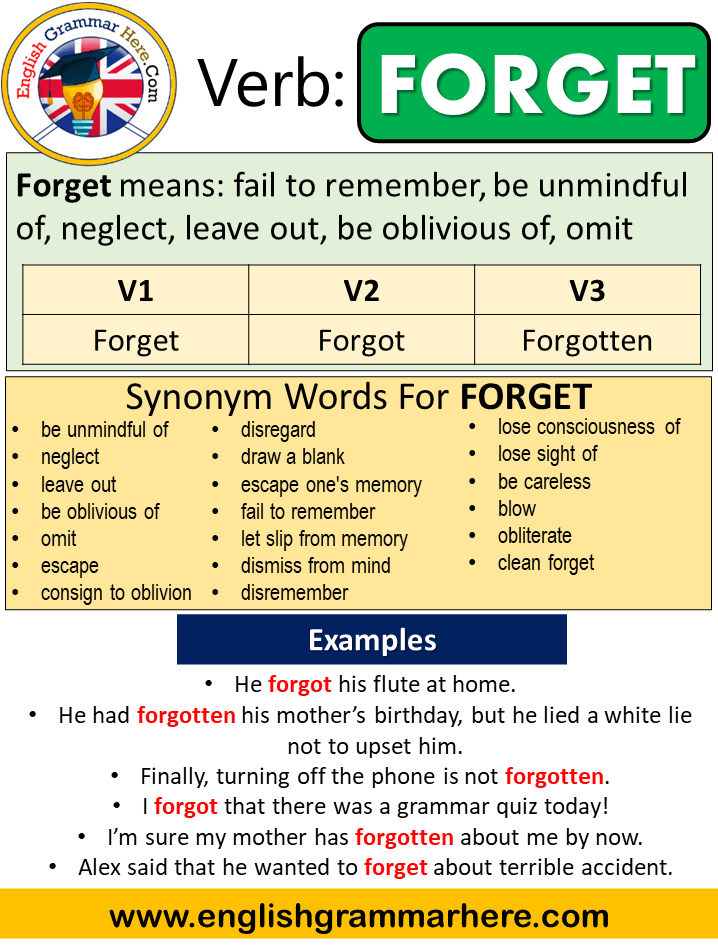
Know Past Simple Simple Past Tense Of Know V1 V2 V3 Form Of Know
The verb "know" is an irregular verb. (This means that "know" does not form its simple past tense or its past participle by adding "-ed" or "-d" to the base form.) The Five Forms of "To Know" Example Sentences with To Know It's your go. Select the correct version of "to know": 1. I the answer yesterday. 2. Sarah who sent the email. 3.

Past Simple Tense (Simple Past) Definition, Rules and Useful Examples
The past form is the same as No. 1, the simple past tense. Read more about the past tense. Forming the Past Form There is no simple rule for creating the past form (i.e., the simple past tense) of a verb. It depends on whether the verb is regular or irregular. Past Form of Regular Verbs Regular verbs form their past forms by adding -ed or -d.

Past Simple Tense Detailed Expression Simple past tense, English
knew or knowed (dialect), past tense of know is knew or knowed (dialect),. Know verb forms Conjugation of Know Simple / Indefinite Present Tense He/She/It knows . I know. You/We/They know. Present Continuous Tense He/She/It is knowing. I am knowing. You/We/They are knowing. Present Perfect Tense

grammar rules for simple past tense Archives English Study Here
Conjugate the verb know in all tenses: present, past, participle, present perfect, gerund, etc.

Past Perfect Tense Definition & Useful Examples in English ESL Grammar
Grammar Reference Irregular Verbs List Definition: To Know Irregular verb: To Know Verb conjugation: Know - Knew - Known Meaning of 'To Know' To be acquainted with To have correctly in your memory Conjugation of verb 'Know' Irregular Verbs Following a Similar Pattern Verbs like: Want to learn about the irregular verb 'to Know'?

Know Verb Forms, Base Form, Past Tense, Past Participle & V1 V2 V3
Irregular verbs are verbs that do not follow the normal patterns for tense and past participle. While most English regular verbs use the ending "-ed" for the past tense and participle forms, irregular verbs each have their own unique tense forms and past participles. Irregular verbs are one of the hardest parts of the modern English.
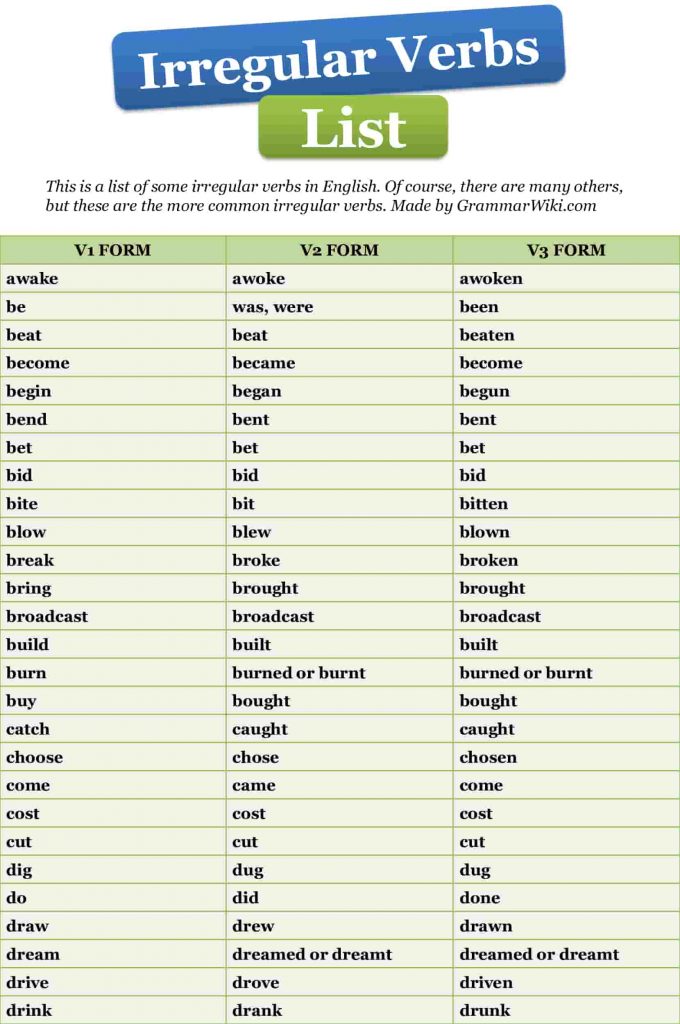
Past Tense 4 Types & When to Use (with Examples)
past participle: (to) know knowing know n definition in Spanish in French in Italian Indicative Perfect tenses Continuous (progressive) and emphatic tenses Compound continuous (progressive) tenses Conditional Imperative Subjunctive

v1 v2 v3 forms of KNOW Archives EngDic
Verb Tenses Past simple — know in past simple knew (V2) . Future simple — know in future simple is know (will + V1) . Present Perfect — know in present perfect tense is known (have/has + V3) . Past Perfect — know in past perfect tense is known (had + V3) . know regular or irregular verb? 👉 Is 'know' a regular or irregular verb?

Simple Past TenseGrammar Rules Grammarly
Answer The past tense of know is knew . The third-person singular simple present indicative form of know is knows . The present participle of know is knowing . The past participle of know is known . Find more words! know Similar Words found achieved attained acquired got gained obtained understood had realized US won felt landed reached wangled
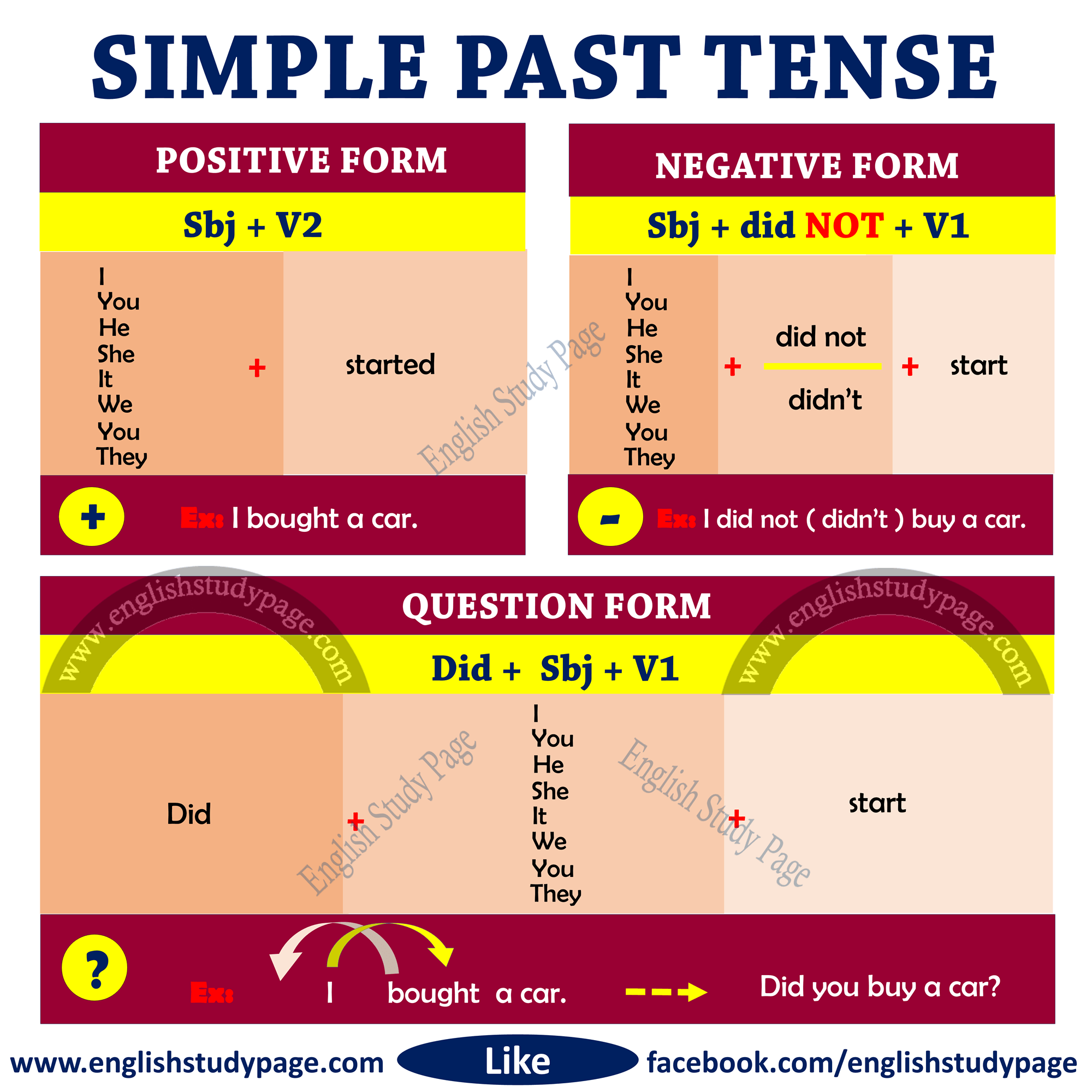
Structure of Simple Past Tense English Study Page
"Knew" is the simple past tense form of "to know." "Known" is the past participle form of "to know," used with auxiliary verbs. Correct usage of "knew" and "known" indicates precise times or connections to the present. It is important to recognize when to employ these forms correctly to convey the intended meaning.
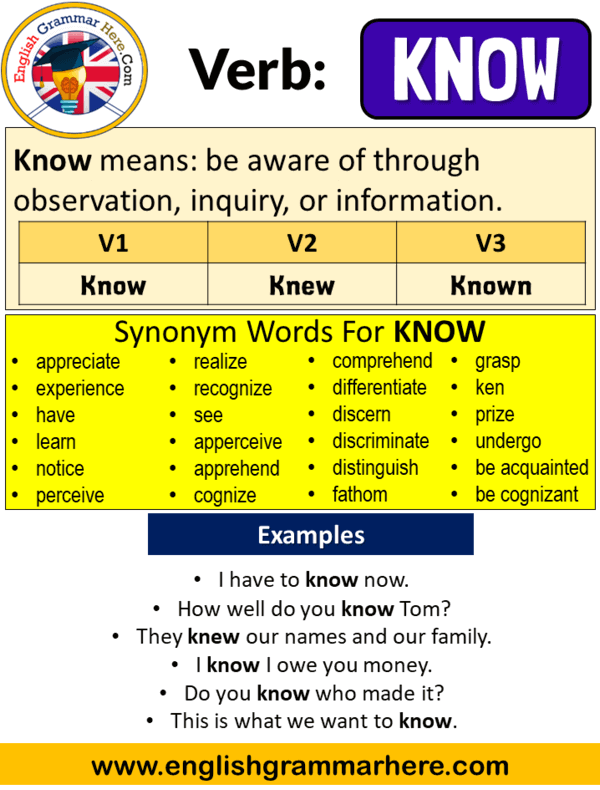
Know Past Simple, Simple Past Tense of Know, V1 V2 V3 Form Of Know
to know Preterite knew Past participle known Model : grow Auxiliary : have, be Other forms: know oneself / not know Contractions Advertising Indicative Present I know you know he/she/it knows we know you know they know Preterite I knew you knew he/she/it knew we knew you knew they knew Present continuous I am knowing you are knowing
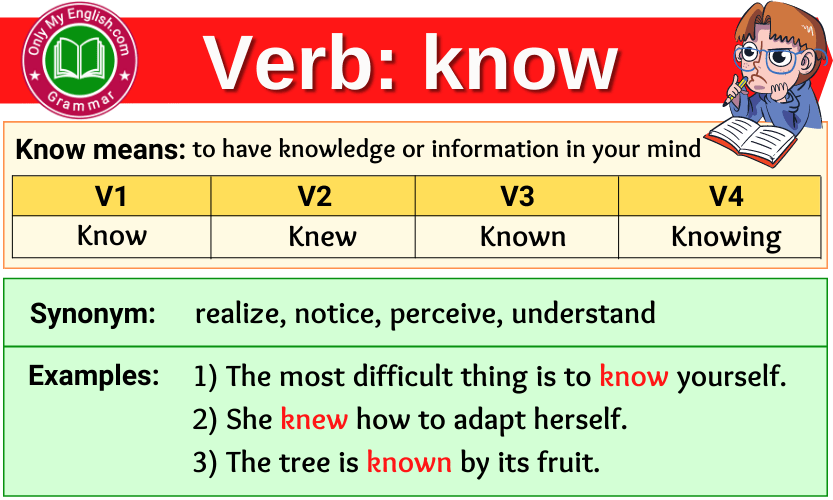
Know Verb Forms Past Tense, Past Participle & V1V2V3
Simple / Indefinite Present Tense I know you. He/She/It know you. You/We/They know you. Simple Past Tense I knew you. He/She/It knew you. You/We/They knew you. Simple Future Tense I will/shall know you. He/She/It will know you. You/We/They will/shall know you. Present Continuous Tense I am knowing you. He/She/It is knowing you.
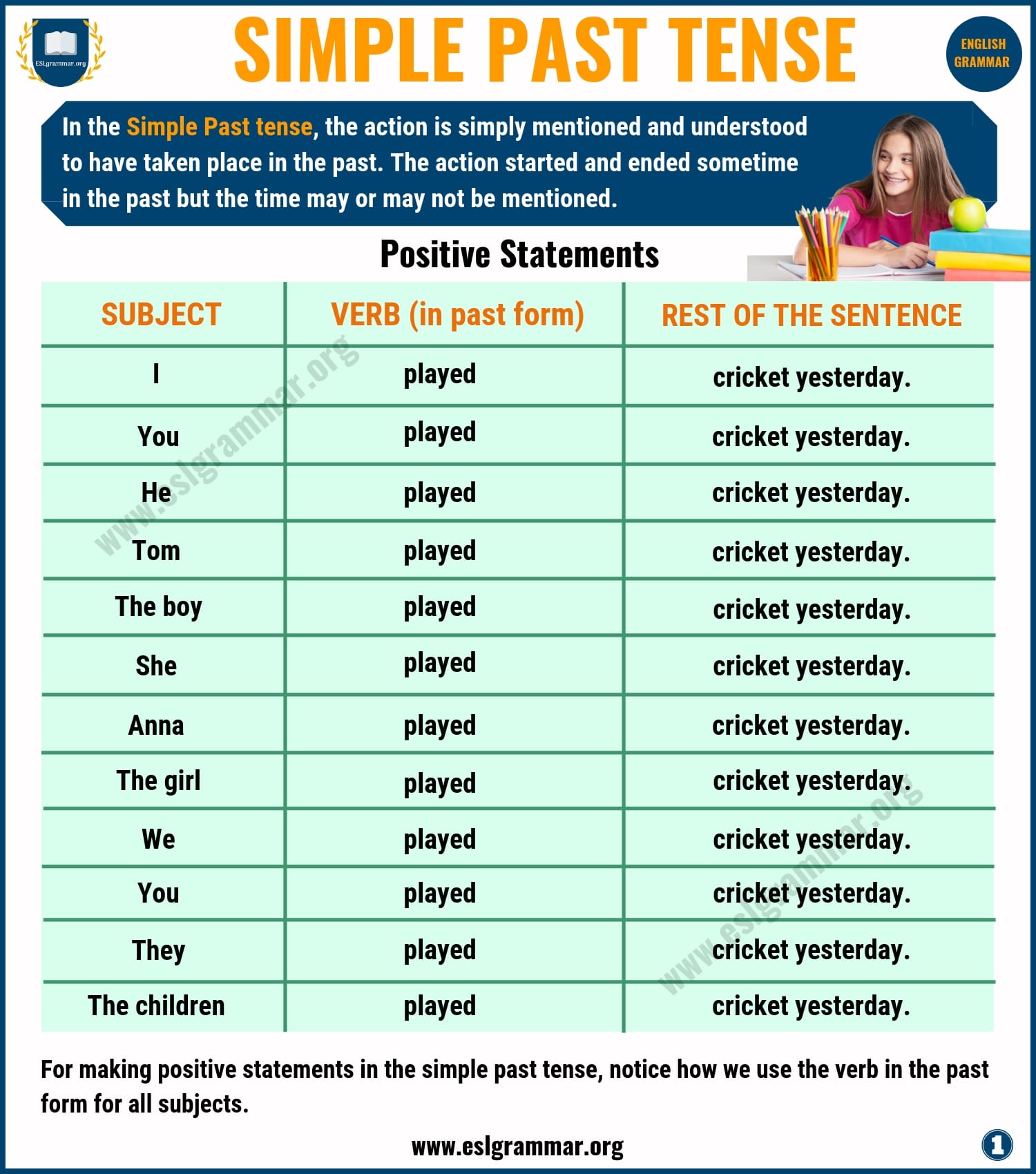
Simple Past Tense Definition & Useful Examples in English ESL Grammar
'Know' is the present tense, 'knew' is the past tense form, and 'had/have known' is the past participle form of the verb. Last updated on December 6th, 2023 at 10:03 pm Contents What is the past tense of 'know'? Conjugations of know: What is the past tense and participle of know? Examples of know in the present tense (in sentences)

Past Tense of Know, Past Participle of Know, V1 V2 V3 V4 V5 Form of
The past and present participle form of know is "known". For example, "I have known her for years" is correct. Confusing "knew" and "new" Another common mistake is confusing "knew" with "new". "Knew" is the past tense form of "know", while "new" is an adjective that means recently made or discovered.